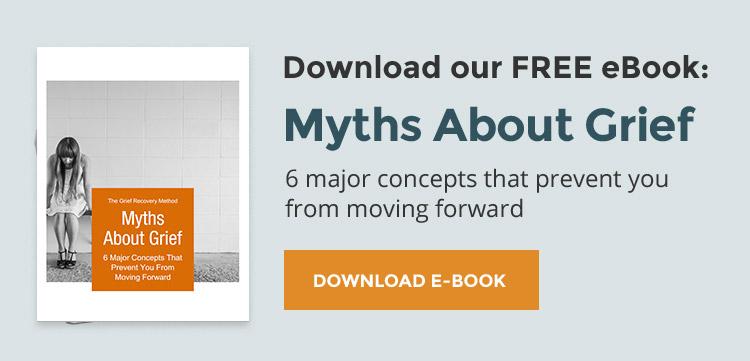Sadly, much of the information available on the topic of the grief process is incorrect and not helpful for people devastated by significant emotional loss.
For more than 35 years we, at The Grief Recovery Institute®, have been observing and assisting hundreds of thousands of grievers worldwide. As the result we are constantly publishing correct information about grief. Our solution for people who are dealing with grief is embodied in The Grief Recovery Method®, which over the years has become the gold standard for recovery from grief.
What is the grief process?
“Grief is the conflicting feelings we experience following the end of, or the change in any familiar pattern of behavior.”
A simple example would be when my mother died. She had been ill for over six years. One morning I received the call that she had passed away peacefully in her sleep. Immediately two thoughts jumped into my mind. One was, “Thank God.” Which is a positive feeling. Moments later the second thought was, “I’m going to miss her sweet smile.” Notice that both feelings are normal and natural and as such are part of grief.
The same example could also apply to all kinds of loss. Let’s look at loss of trust. A friend betrays you. A first feeling might be one of sadness or even anger. While the second feeling might be one of relief that you found out about the loss now instead of later.
Although grief is the normal and natural response to loss of any kind, it is shrouded in mystery and misunderstanding. There is more confusion surrounding grief than any other human experience – and this confusion grows each year.
Using Intellect doesn't help
 Educated people write articles; the psychotherapeutic community publishes articles; the entertainment community through television and movies tries to address the topic of grief. What they all have in common is that they try to address grief through intellect. And grief is an emotional event, not an intellectual one.
Educated people write articles; the psychotherapeutic community publishes articles; the entertainment community through television and movies tries to address the topic of grief. What they all have in common is that they try to address grief through intellect. And grief is an emotional event, not an intellectual one.
Recently a small war has been raging over the upcoming publication of the DSM-V (Diagnostic and Statistical Manual of Mental Disorders). It has even gone so far as to try to label normal grief as what they call an MDE (Major Depressive Episode).
Grief is an emotional experience and no matter how hard society tries to act as if sad feelings don’t exist – they do. Trying to use intellect to heal your heart will not work. Only the correct set of actions that lead to what is unresolved emotionally in a relationship will help.


Image credit: tommasolizzul / 123RF Stock Photo























Comments
Nancy Piper-Jankovich
I don't believe that there are "correct" ways to deal with grief. Each person's loss is unique to that person. You can work on what NOT to say to someone who has just suffered a traumatic loss. Often, saying nothing but just expressing concern and care go a long way. And, if you make a mistake in what you say but show by your actions that you care, your actions will speak louder than your words.
Russell Friedman
Hi Nancy,
Thanks for your note.
We agree 100% with the idea that each person’s loss is unique to them. In The Grief Recovery Handbook, on pages 14/15 we say: “There are no absolutes in grief. There are no reactions so universal that all, or even most, people will experience them. There is only one unalterable truth: All relationships are unique.”
But respectfully, we disagree with the idea idea that there are no correct ways to deal with unresolved grief. [yes, I added the word “unresolved” which wasn’t in your comment].
On page 8 of the Handbook, there is a bold headline that says, “Recovery from loss is achieved by a series of small and correct choices made by the griever.”
I did that because the last sentence in John’s blog says, “Only the correct set of actions that lead to what is unresolved emotionally in a relationship will help.” And the key in that sentence is the phrase, “unresolved emotionally.”
The fact may well be that we are not in disagreement with you at all, as long as it’s understood that The Grief Recovery Method is not about grief as such, it’s about helping people deal with the unresolved grief.
Warm regards,
Russell and John
Add new comment